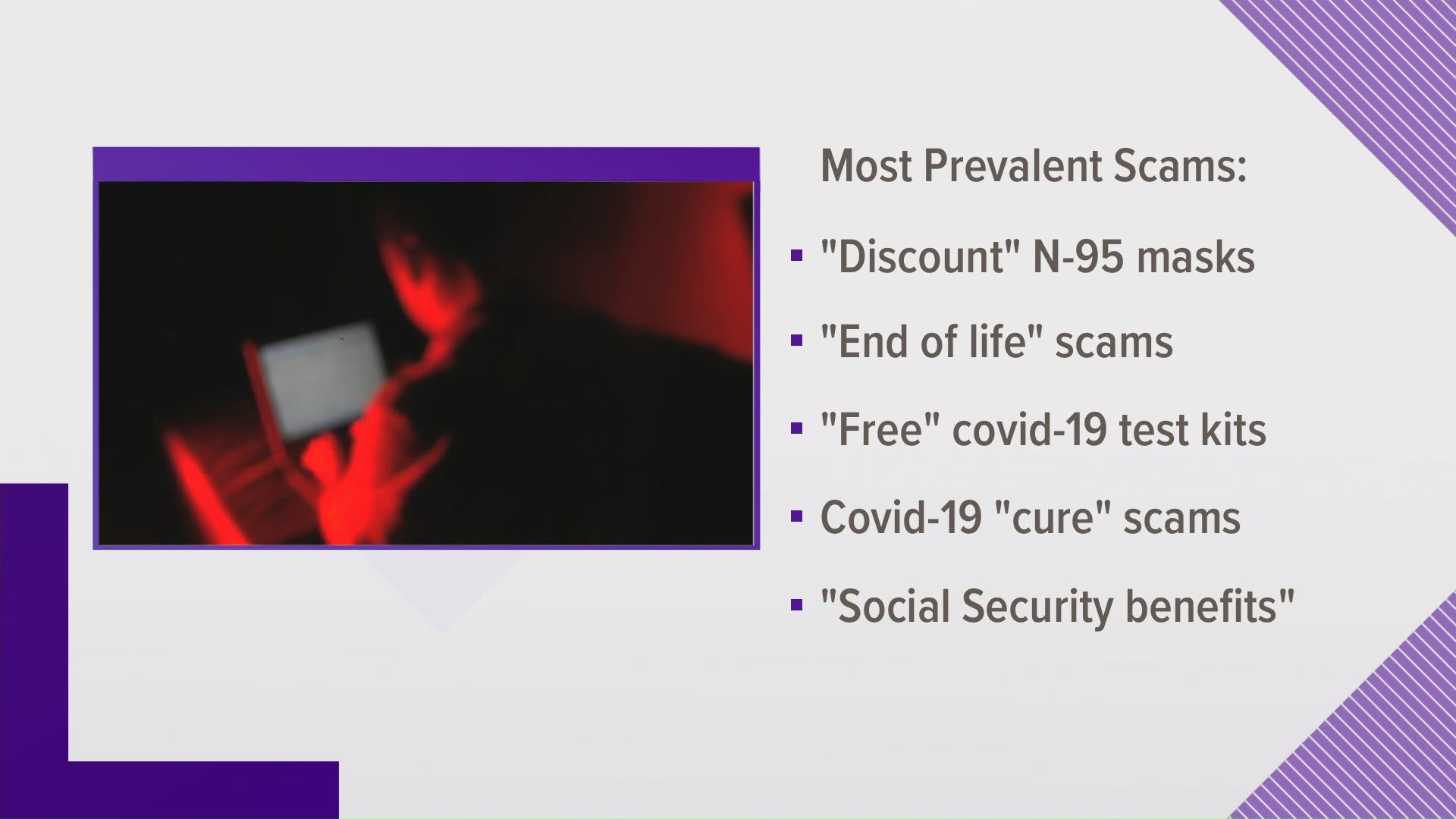COLORADO, USA — Scam activity due to the COVID-19 pandemic as well as around the holidays is increasing, according to the American Association of Retired Persons (AARP).
The Federal Trade Commission (FTC) said most of the fraud is originating on social media. Social media websites and apps have become popular hangouts for scammers; in November, 243,000 consumers reported total losses of about $177 million.
N-95 mask scams, end of life scams, free COVID-19 testing kit scams and COVID-cure scams are among some of the most common.
> Video above: VERIFY: Some scammers trying to take advantage of COVID-19 vaccine misinformation.
Fraud expert Cary Johnson, director of the Jefferson County District Attorney's Communities Against Senior Exploitation Partnership, said the scam that concerns him the most is the "social security benefit scam." The FTC said this is currently the most prevalent scam in the country.
"A call comes in, they say they're the Social Security Administration (SSA), and that your number has been used in a crime somewhere in the United States...so they're having to cut-off (your) benefits," Johnson said. "And I've had people call me in a near panic because Social Security is all they had. And so when they heard this, they were willing to do whatever the caller asked them to do, which is usually provide a credit card or go get some gift cards to make sure their benefits don't get cut off."
Johnson said if you are over age 60, you have a target on your back. Crooks and scammers have purchased information about you from computer hacks that have occurred over the years in which huge databases have been stolen from companies that weren't aggressively protecting them.
"The thieves already have just enough information from them to make you think their calls sound legitimate," Johnson said.
Johnson said people should know the following pieces of information:
- No government agency will ever call you to solve some sort of consumer or citizen problem.
- IRS won't call you because you owe money.
- Social Security won't call because your number has been used.
- Medicare won't call to settle a medical bill or a free DNA test to detect cancer.
- The clerk and recorder's office won't call to check your address or voting status
- The district attorney's office won't call if you miss jury duty.
Johnson said a good website to check the validity of other websites is: global.sitesafety.trendmicro.com/index.php
He also said the best defense against all scammers is not to answer your phone in the first place. Ignore any numbers you don't recognize. If someone really needs to speak to you, they'll leave a message. You'll recognize a message from a scammer, Johnson said, because they'll want something you shouldn't give them, such as personal information — or they will threaten you with bogus legal action just to frighten you.
Below is a list of common COVID-19 scams Johnson said are prevalent right now.
Stolen federal stimulus payments
Federal stimulus payments have been an easy target for scam artists.
In April, the IRS launched an online tool to help easily distribute payments to Americans who had not filed income taxes during 2018 or 2019.
Eligible users were asked to provide personal information, including full name, current mailing address, email address and date of birth, plus a valid Social Security number and bank routing number.
Personal info can be stolen through data breaches, fake websites or scam calls allowing scammers to claim stimulus checks that don’t belong to them.
Scam artist impersonating government agencies
The FBI has reported a rise in fake emails claiming to be from the CDC or other organizations claiming to offer information on the coronavirus.
The FBI warns not to click links or open attachments from unknown senders. As this can unlock malware, allowing scammers to steal your personal info.
Waylaid donations
Donating to food banks or hospitals can make a difference during the pandemic. Just make sure your money is going where it’s intended. The FBI has noted a rise in fishing emails asking for donations to charity. Research your charity of choice before opening your pocketbook.
Bogus offers for vaccinations and home test kits
There is no federally approved vaccine or a home test for COVID-19. But that hasn’t stopped scammers from peddling fake cures to worried Americans. If you suspect you’ve contracted the virus, contact your doctor for testing. Don’t share your medical information or social security number online.
Johnson said the following steps can help better secure personal information from thieves:
- Frequently check your key financial accounts for unauthorized charges.
- Contact your bank if you notice any suspicious activity on your account.
- Frequently change your online passwords to better protect against breaches.
- Remove personal information from your social media accounts.
Visit the COVID plus credit financial resource center on equifax.com for more information.
SUGGESTED VIDEOS: Senior Source

